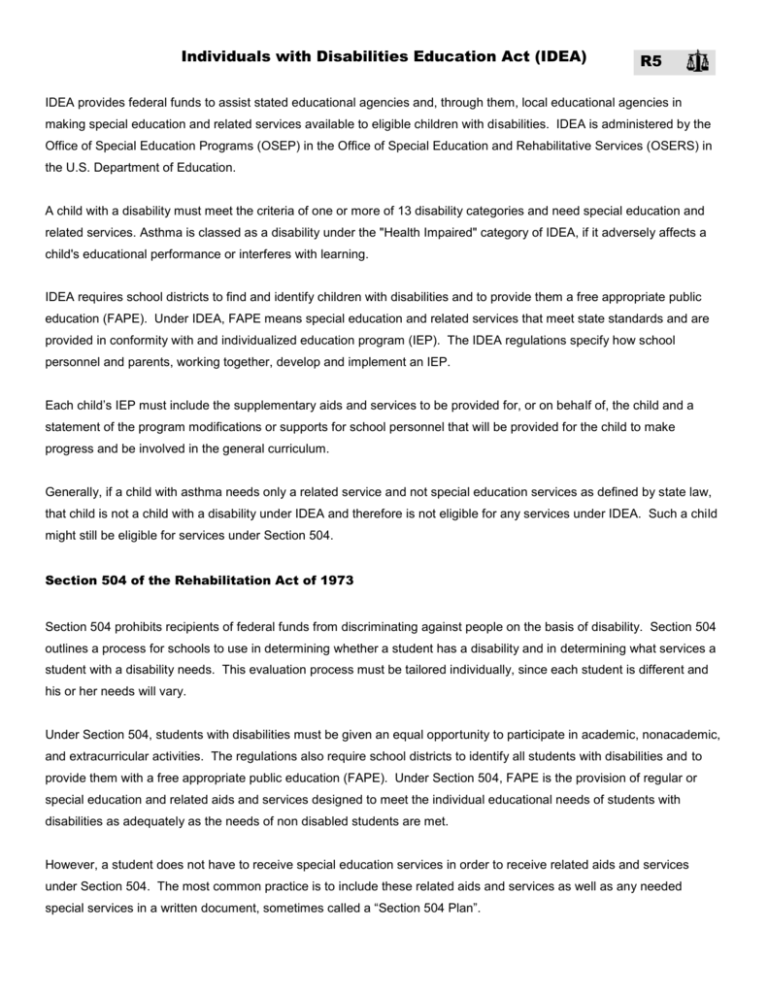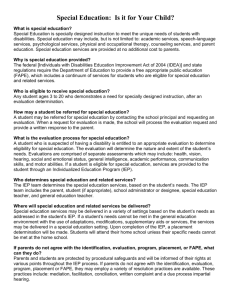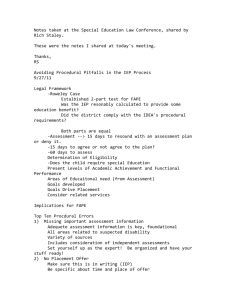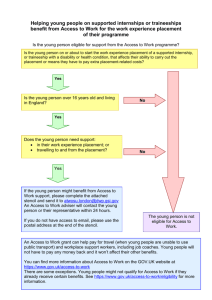IDEA (Individuals with Disabilities Education Act)
advertisement

Individuals with Disabilities Education Act (IDEA) R5 IDEA provides federal funds to assist stated educational agencies and, through them, local educational agencies in making special education and related services available to eligible children with disabilities. IDEA is administered by the Office of Special Education Programs (OSEP) in the Office of Special Education and Rehabilitative Services (OSERS) in the U.S. Department of Education. A child with a disability must meet the criteria of one or more of 13 disability categories and need special education and related services. Asthma is classed as a disability under the "Health Impaired" category of IDEA, if it adversely affects a child's educational performance or interferes with learning. IDEA requires school districts to find and identify children with disabilities and to provide them a free appropriate public education (FAPE). Under IDEA, FAPE means special education and related services that meet state standards and are provided in conformity with and individualized education program (IEP). The IDEA regulations specify how school personnel and parents, working together, develop and implement an IEP. Each child’s IEP must include the supplementary aids and services to be provided for, or on behalf of, the child and a statement of the program modifications or supports for school personnel that will be provided for the child to make progress and be involved in the general curriculum. Generally, if a child with asthma needs only a related service and not special education services as defined by state law, that child is not a child with a disability under IDEA and therefore is not eligible for any services under IDEA. Such a child might still be eligible for services under Section 504. Section 504 of the Rehabilitation Act of 1973 Section 504 prohibits recipients of federal funds from discriminating against people on the basis of disability. Section 504 outlines a process for schools to use in determining whether a student has a disability and in determining what services a student with a disability needs. This evaluation process must be tailored individually, since each student is different and his or her needs will vary. Under Section 504, students with disabilities must be given an equal opportunity to participate in academic, nonacademic, and extracurricular activities. The regulations also require school districts to identify all students with disabilities and to provide them with a free appropriate public education (FAPE). Under Section 504, FAPE is the provision of regular or special education and related aids and services designed to meet the individual educational needs of students with disabilities as adequately as the needs of non disabled students are met. However, a student does not have to receive special education services in order to receive related aids and services under Section 504. The most common practice is to include these related aids and services as well as any needed special services in a written document, sometimes called a “Section 504 Plan”. IDEA (Individuals with Disabilities Education Act) Special Education Law Regulatory Requirements Purpose To insure that all children with disabilities have available to them a free appropriate public education. Who is protected List of 13 categories of qualifying conditions. Asthma is classed as a disability under the "Health Impaired" category of IDEA, if it adversely affects a child's educational performance or interferes with learning. Duty to provide Free Requires the provision of a free appropriate education for students, covered including and appropriate individually designed program. Requires the district to provide IEP's. "Appropriate education" Education means a program designed to provide "educational benefit." Special Education A student is eligible to receive IDEA services only if the multidisciplinary team determines that VS. Regular the student has one of the handicapping conditions and needs special education or related Education services. Funding If a student is eligible under IDEA, the district receives additional funding. Accessibility Not specifically mentioned, although if modifications must be made in order to provide a free appropriate education to a student, IDEA requires it. General Notice IDEA requires child find activities. Requires notification of parental rights. Notice of Consent A notice is required to the parent or guardian with respect to identification, evaluation and placement. Requires written notice. Notice provisions are more comprehensive and specify what the notice must provide. Written notice is required prior to any change in placement. Requires consent for initial evaluation and placement. Evaluations Requires consent before an initial evaluation is conducted. Re-evaluations must be conducted at least every 3 years. Does not require a re-evaluation before a significant change in placement. Provides for outside independent evaluations. Determination of Done by admission review and dismissal (ARD) committee. Parent is an equal member of the Eligibility Program committee. and Placement Grievance Procedure IDEA does not require a grievance procedure nor a compliance officer. Due Process To provide impartial hearings for parents or guardians who disagree with the identification, evaluation, or placement of student with disabilities. Hearings conducted by a state hearing officer (who is an attorney). Decisions may be appealed to court. Enforcement Compliance is monitored by the state education agency. The state education agency also receives and resolves complaints regarding IDEA. Office for Civil Rights does not enforce. Information taken from a handout written by Texas Education Agency; www.adda-sr.org/idea.htm Section 504 R5 Regulatory Requirements Purpose To prohibit discrimination on the basis of a disability in any program receiving federal funds Who is protected A student is eligible so long as he/she meets the definition of qualified handicapped person; i.e. has or has had a physical or mental impairment which substantially limits a major life activity, has a record of or is regarded as handicapped by others. Duty to provide Free Requires the provision of a free appropriate education for students covered including and Appropriate individually designed programs. "Appropriate" means an education comparable to the Education education provided to non-handicapped students. Special Education A student is eligible so long as he/she meets the definition of qualified handicapped person. VS. Regular i.e., has or has had a physical or mental impairment which substantially limits a major life Education activity, or is regarded as handicapped by others. The student is not required to need special education in order to be protected. Funding Additional funds are not provided for these services Accessibility Detailed regulations regarding building and program accessibility. General Notice 504 requires "Child Find" activities. Districts must include notice of discrimination in its employee, parent, and student handbook, and must designate the district's 504 coordinator(s). Notice of Consent A notice is required to the parent or guardian with respect to identification, evaluation and placement. Requires notice. A district would be wise to give the notice in writing. Requires notice before a "significant change in placement." Consent not required, but if a handicapping condition under IDEA is suspected, those regulations must be followed. Evaluations Require notice, not consent. Requires periodic re-evaluations. Requires a re-evaluation before a significant change in placement. Does not provide for outside independent evaluations. Determination of Done by a group of persons knowledgeable about the child, the evaluation data, and Eligibility Program placement options. Parental participation is not mentioned in the regulations. and Placement Grievance Procedure Districts with more than 15 employees must designate an employee to be responsible for assuring district compliance with Section 504 and provide a grievance procedure (an informal hearing before a district staff member) for parent, students, and employees. Due Process To provide impartial hearings for parents or guardians who disagree with the identification, evaluation or placement of students with disabilities. Hearings conducted at the local level by an impartial person not connected with the school district. Person need not be an attorney. Decisions may be appealed to court Enforcement Enforced by the Office of Civil Rights by complaint investigation and monitoring activities






![Your Rights Under Section 504 [Insert District Name or Logo]](http://s3.studylib.net/store/data/006624470_1-8c8cc2a05ba2b54c1cfb7a481499029c-300x300.png)

